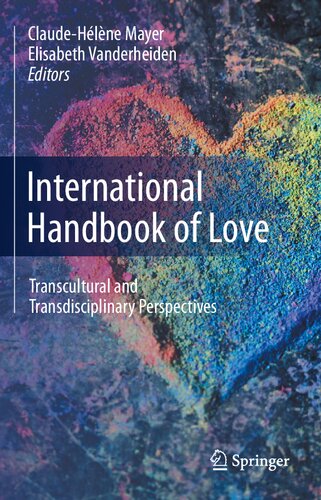

Most ebook files are in PDF format, so you can easily read them using various software such as Foxit Reader or directly on the Google Chrome browser.
Some ebook files are released by publishers in other formats such as .awz, .mobi, .epub, .fb2, etc. You may need to install specific software to read these formats on mobile/PC, such as Calibre.
Please read the tutorial at this link: https://ebookbell.com/faq
We offer FREE conversion to the popular formats you request; however, this may take some time. Therefore, right after payment, please email us, and we will try to provide the service as quickly as possible.
For some exceptional file formats or broken links (if any), please refrain from opening any disputes. Instead, email us first, and we will try to assist within a maximum of 6 hours.
EbookBell Team

5.0
48 reviewsTh is handbook includes state-of-the-art research on love in classical, modern and postmodern perspectives. It expands on previous literature and explores topics around love from new cultural, intercultural and transcultural approaches and across disciplines. It provides insights into various love concepts, like romantic love, agape, and eros in their cultural embeddedness, and their changes and developments in specific cultural contexts. It also includes discussions on postmodern aspects with regard to love and love relationships, such as digitalisation, globalisation and the fourth industrial revolution. Th e handbook covers a vast range of topics in relation to love: aging, health, special needs, sexual preferences, spiritual practice, subcultures, family and other relationships, and so on. Th e chapters look at love not only in terms of the universal concept and in private, intimate relationships, but apply a broad concept of love which can also, for example, be referred to in postmodern workplaces. Th is volume is of interest to a wide readership, including researchers, practitioners and students of the social sciences, humanities and behavioural sciences.
In the 1970s through the 90s, I was told that globalization was homogenizing cultures into a worldwide monoculture. Th is volume, as risky and profound as the many adventures of love across our multiplying cultures are, proves otherwise. Th e authors’ revolutionary and courageous work will challenge our sensibilities and expand the boundaries of what we understand what love is. But that’s what love does: It communicates what is; offers what can be; and pleads for what must be. I know you’ll enjoy this wonderful book as much as I do!
The International Handbook of Love is far more than a traditional compendium. It is a breath-taking attempt to synthesize our anthropological and sociological knowledge on love. It illuminates topics as diverse as Chinese love, one-night stands, teen romance or love of leaders and many more. Th is is a definitive reference in the field of love studies.
Eva Illouz, author of Th e End of Love: A sociology of Negative relationships. Oxford University Press.